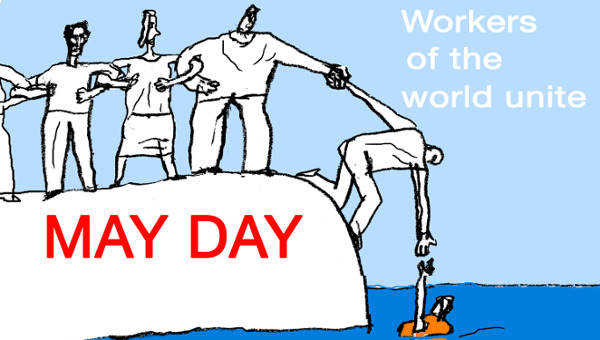Ontario’s Bill 150 and the Right to Strike

The purpose of the Ontario Government’s Bill 150 is effectively to break the union. When the employer says “no” at the bargaining table, and you can’t walk out in support of your bargaining objectives, then you have to ask yourself with respect to unions: “what is the purpose of being there?”
Workers join unions to improve their working and economic conditions. Without the ability to fight for gains, employers will have an open door to begin the process of stripping away gains earlier achieved through collective bargaining. These often include such things as reducing contributions to future retirement plans or terminating workplace programs like day care benefits or health and safety rights. Once they’ve tasted blood, of course, the list of demands from employers will be endless – as long as the index in current Collective Bargaining Agreements. Why would workers want to remain in unions that simply preside over the deterioration of their economic standing, job security and working conditions?
The Wage and Price Controls imposed by the Federal Government of Pierre Trudeau in the mid-1970s were temporary. But the danger was sufficiently clear to workers that 100,000 unionists, along with our allies, marched on Parliament Hill. In 1995, the Ontario government of Mike Harris was rolling back important social gains, and even though we were not about to permanently lose the right to strike, the union movement mobilized and protested in communities across Ontario, shutting down hundreds of workplaces. Bill 150 and its inevitable aftermath may end being a far more serious and permanent threat than the draconian actions of both Trudeau and Harris. Bill 150 is a cornerstone of the strategy of the business and professional elites in Ontario to make even more gains at the expense of the rest of us.
The question – and it is now a question of historic significance given the events unfolding in the U.S. with respect to union rights – is how will the union movement now respond? Will we simply plead for leniency? Will we promise to back off challenging the “boss” in the workplace in return for keeping some of what we already have? The countless workers and families that sacrificed in the past so that we might enjoy a decent standard of living in retirement must be turning over in their graves and asking: Why has the struggle not yet begun? Where is the labour movement?
Canada and Anti-Union Politics in the U.S.
In Wisconsin, business owners and “neoliberal right” articulated the main purpose of government policies to curtail union rights to be cost savings. At the same time, they cut taxes for the rich and only exempted certain public sector employees like firefighters and police from the sweeping legislative assault (who promptly came out, to their credit, in support of their brothers and sisters in the rest of the public sector). In Ohio, the state government removed the right to strike from virtually all public servants. It is Ohio, not Wisconsin, that will become the template for the radical right to follow in those states that also have recently elected Tea Party supported Governors, Senate and House members. Other states, like former union strong-hold Michigan, and predictable anti-union states such as Arizona and Florida and, at the time of writing six others, are already following suit.
Why are the events in the United States important to unionists in Canada? First, the anti-union attacks won’t stop at the border. They will encourage and legitimate those who are anxious to see the same developments in Canada. Second, it’s not just a matter of importing regressive ideas from the United States. Look around, and it’s pretty clear that public sector workers have been vilified for some time now within Canada and are just as vulnerable to being pitted against ‘taxpayers’ and private sector workers. Never mind that this opposition of private sector workers to public sector workers obscures the real class inequalities in our society – those between the corporate rich and the rest of us. And never mind that destroying public sector unions will contribute to lowering standards for all other workers.
It’s pretty obvious the attack on the Amalgamated Transit Union (ATU) of the Toronto Transit Commission (TTC) workers won’t stop with this group of workers. Bill 150 is an opening to expand the TTC assault to other jurisdictions that makes the same arguments as Mayor Ford and friends. Who might be next? Municipal employees could be, with the argument that taxpayers can save more money if these services are moved into the private sector. The fact that privatization means that the very same taxpayers will subsequently be paying the added costs of profits and executive salaries is left aside (never mind the reputation of privatized garbage collection for corruption, as immortalized in The Sopranos TV series). If they can get away with privatizing municipal services, this invites the extension to provincial services like health care and education. In Florida, for example, the newly elected Republican Governor is already moving to privatize prisons and schools, a first step in dismantling public education and its access for lower income families. There is, indeed, a slippery slope of endless attacks when union rights are conceded.
The corporations and the right often trot out the need for a level playing field between the private and public sectors. Having pushed private sector workers to make concessions, the shrill comments come out against ‘privileged’ public sector workers, and calls begin for the ratcheting down of all jobs so they can be equally lower paid and more precarious.
The Ontario Union Movement and Fighting BackMany respond by saying: “Alarmist! Can’t happen here!!” But tell me when in our lifetime have we seen such a scope of an attack on the one basic rationale for union existence and membership support? Someone once said if we don’t learn the mistakes of history, we are bound to repeat them. I suspect I feel the same frustrations as many others who came through the fights that advanced workers rights and now see all this being reversed. We’ve got to appreciate that this is not just another battle. This is THE battle. It’s as much a battle for union survival as were the “sit-downs” in Flint, the 1946 Ford and Stelco strikes, and the other major conflicts for union recognition and the right to bargain collectively and withdraw our labour in support of our demands.
So, how should we as unionists respond?
Frederick Douglass, the former American slave and then great social reformer, once said “without struggle there is no progress.” The current message is that without struggle we will not hang on to what we have, let alone build a better world. Douglass argued that “power concedes nothing without a demand – it never did and it never will.” By “demand,” he meant mobilized political pressure. Every strike that ever took place is testimony to the logic and truth of his words.
When the demand contained within the right to strike is threatened, we need to counter not by lamenting what they’ve tried to take away, but by expanding our tools of resistance and preparing for a major struggle. One of our advantages now, as opposed to then, is that many workers and community activists are organized and can be reached. Every union has a leadership structure that is community based. Additionally, there exists in the thousands, retired union staff from national and international unions and their local unions. This is an opportunity for those of us who owe our retirement to our unions and the workers within them. This is as much our fight as current active members and our chance to pay back an outstanding debt.
In short we have the troops. But what we don’t seem to have is a plan. Some may find my reference to “troops” disturbing, but this is in fact a war of economic and social survival. The assault upon working people by the corporations and the powerful will not be accomplished overnight. Nor will our response: we have to prepare for a long and difficult struggle, and we must start now.
Labour leaders must assert that the attacks on the ATU (and even the TTC) are not an isolated event and all unions are at risk. A strategy containing long and short term plans of action must, with haste, be designed, endorsed and implemented. We in the union movement must put all our financial and institutional resources into winning over and mobilizing our troops for the challenges we confront. In my lifetime I have witnessed many times the creativity of union members and social activists in devising tactics. Each tactic and action must have as its core objective to challenge the powerful and the conditions which sustain them. Anything less is a betrayal of the kind of world we want to live in and want for others.
To those that believe that if we accept Bill 150 and the attack on ATU as simply a temporary setback and “dialogue” with those in power, we will somehow be spared, history suggests quite the opposite. We as unionists are just as likely to be the author of the misfortune about to be suffered by the poor, the powerless and all those with potential power but who stood idly by. We can be forgiven for fighting and losing. We cannot be forgiven for not fighting. Let the struggle begin. No justice, no peace, in the streets or in the boardrooms of the corporations. •





